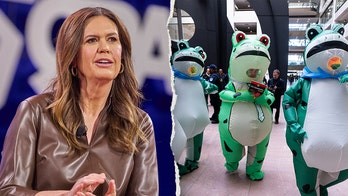
In this Aug. 31 photo, crowds of job-seekers wait to enter a job fair at Crenshaw Christian Center in South Los Angeles. (AP2011)
Members of the deficit-cutting "super committee" had a rare Washington moment of consensus earlier this month. At their opening session, Republican and Democratic lawmakers each stressed that the primary focus, as they look to cut $1.5 trillion, should be on creating jobs.
They didn't say how they'd achieve both goals but argued they were not mutually exclusive.
The fiery fallout from President Obama's deficit-reduction plan shows how politically tricky it is to focus on a jobs crisis and a debt crisis at the same time. With a call to raise taxes as part of his broad strategy, lawmakers and strategists quickly complained that Obama's proposal yanked the focus once more off job creation.
"The point is this -- it's about jobs right now. You don't create jobs by raising taxes," House Republican Leader Eric Cantor was quoted saying at a local event in Virginia.
While a growing economy helps balance budgets, how to get that economy growing in the first place is another matter -- particularly when the credit-ratings agencies are demanding the federal government take bold action now on the deficit.
Obama is trying to do both. The president's proposal is tied to his American Jobs Act, a $447 billion package of targeted tax breaks and unemployment aid and state government assistance and infrastructure spending. The president introduced the bill after vowing to put the might of his administration behind jump-starting an economy that has sputtered along since the recession.
But with federal funds painfully short, Obama ended up proposing tax increases to pay for the plan. Then he proposed more tax increases as part of a broader deficit-reduction roadmap.
Patrick Louis Knudsen, a senior fellow with the conservative Heritage Foundation, said the roll-out showed how boxed-in the government's approach to a bad economy has become.
"It's almost as if Washington has run out of ... an economic philosophy that works," he said, noting that deficit-deepening stimulus packages are the go-to answer. The approach spanned the Bush and Obama administrations. "It doesn't seem to have broken out of that into a different vision."
But Knudsen said there are ways to stimulate job creation, without blowing up the budget and without requiring large tax increases. Republicans have pushed the president to pursue lower-cost measures that could imbue more certainty into the economy, like stripping regulations that make it more expensive for businesses. Knudsen said revenue-neutral tax reform that closes loopholes and lowers rates could promote growth.
The magnitude of the tax hikes Obama is proposing, critics say, could ultimately water down the goal of stimulating job creation.
"We're trying to create jobs, and if you increase taxes on people who hire folks, you're not going to move the ball forward on reducing unemployment," Sen. Lindsey Graham, R-S.C., told Fox News. "This is a conflict created by the president to help his polling numbers."
Obama said Monday he wants to use savings from the elimination of loopholes and deductions to lower corporate tax rates. But the plan still includes $1.5 trillion in net tax hikes. Through what the administration is calling the "Buffett Rule," it would create a new, undefined tax rate for those making more than $1 million annually. The bulk of the new tax income, however, would come from hiking Bush-era tax rates for households making more than $250,000 a year.
Mark Penn, a former strategist for Hillary Clinton when she was running against Obama for president, wrote in a column that the president's fresh focus on tax increases could create serious political problems, not just economic ones.
"Americans wants to see the president focused on stimulating jobs and innovation, not on raising taxes in a near recession," Penn said, adding that Obama could be pushing tax reform that raises rates for capital income without going to such lengths.
Penn said the president is in danger of eroding the coalition of low-income and high-income voters who brought him into office in 2008, with voters seeing a "tax-and-spend liberal trying to take taxes and spending to new levels."
Penn, echoing the comments of countless Republican lawmakers since Sunday, said the president had "wandered into the thicket of class warfare."
Obama unequivocally rejects the claim. He said at a fundraiser Monday night that the complaints are "predictable."
"You're already hearing the moans and groans from the other side about how we are engaging in class warfare and we're being too populist ... all the usual scripts," Obama said. "But the truth of the matter is that if we don't succeed, then I think that this country is going to go down a very perilous path."












































